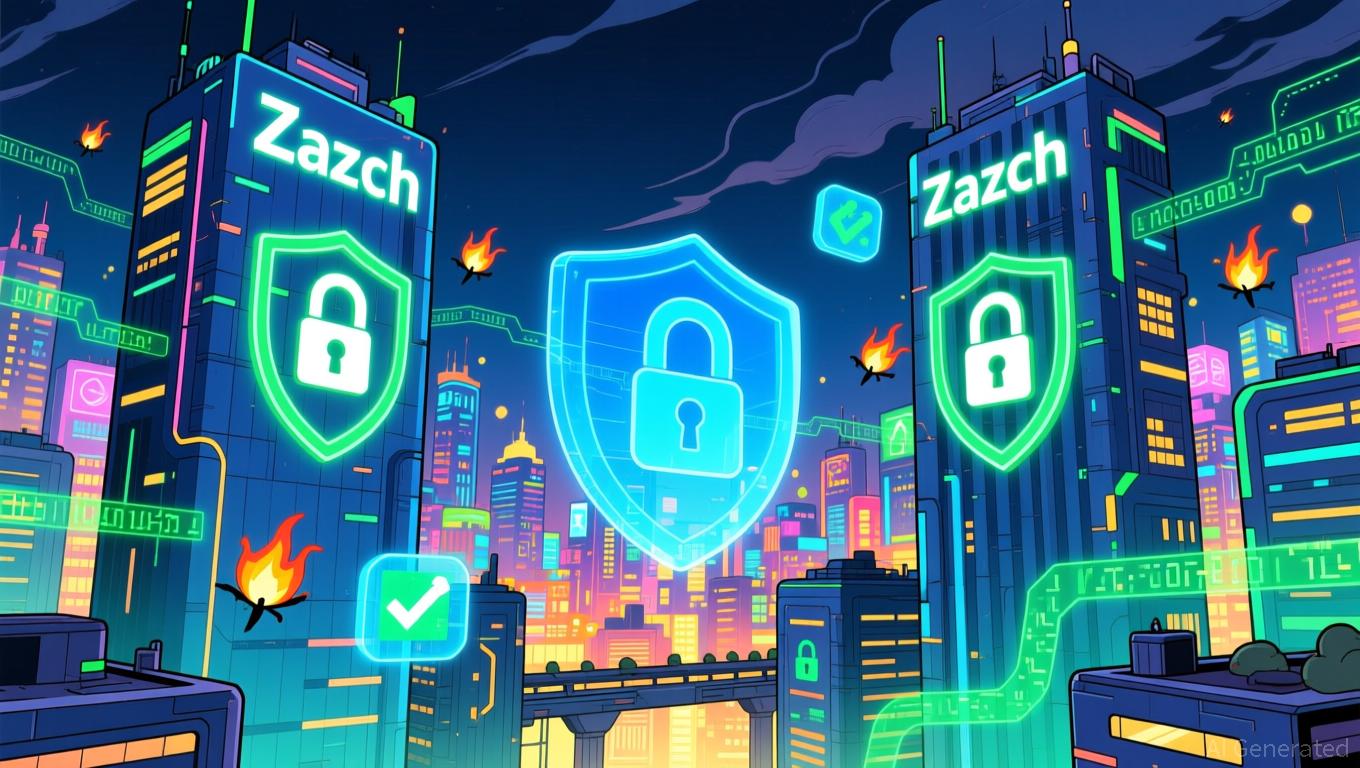ZK Atlas Enhancement: Driving Institutional Embrace Amid the Blockchain Scalability Competition
- ZKsync's Atlas Upgrade solves throughput bottlenecks with Airbender RISC-V zkVM, enabling 15,000+ TPS at $0.0001 per transaction. - Modular ZKsync OS reduces gas fees by 70% since 2023, enabling real-time financial applications while maintaining regulatory compliance. - Deutsche Bank and UBS test ZKsync for asset tokenization, highlighting its institutional appeal through privacy-preserving ZK features and sub-second finality. - Upcoming Fusaka upgrade aims to push TPS to 30,000 by December 2025, but reg
ZKsync Atlas Upgrade: Transforming Institutional Blockchain Adoption

The blockchain sector has consistently faced the challenge of achieving a balance between security, decentralization, and scalability. In 2025, the ZKsync Atlas Upgrade emerges as a game-changing development, setting new standards for both technology and economics within Ethereum Layer 2 (L2) solutions. By introducing the Airbender RISC-V zkVM and a modular ZKsync operating system, this upgrade not only overcomes throughput limitations but also meets the rigorous compliance and performance requirements of institutional users. This overview examines how Atlas's advancements could drive a new wave of institutional engagement in L2 solutions, fundamentally altering the blockchain infrastructure landscape.
Breakthrough Technology: Airbender zkVM and Modular OS
At the heart of the Atlas Upgrade is the Airbender RISC-V zkVM, which delivers over 15,000 transactions per second at a cost of just $0.0001 per transaction. This marks a significant improvement over traditional optimistic rollups like Arbitrum and Optimism, which depend on delayed finality for fraud detection. By compiling execution to RISC-V for proof generation, Airbender removes the risk of inconsistent logic between execution and verification, thereby boosting both security and efficiency.
Supporting this is the modular ZKsync OS, which has cut gas fees by 70% since 2023. This dramatic reduction is crucial for institutions aiming to launch real-time financial services, such as instant asset settlements or high-frequency trading. The modular design also empowers organizations to create private or semi-public Ethereum-linked chains while upholding regulatory standards and transparency. Notably, major banks like Deutsche Bank and UBS have already piloted ZKsync's infrastructure for asset tokenization, benefiting from its privacy-centric zero-knowledge features.

Driving Institutional Adoption: Compliance, Liquidity, and Instant Settlement
Historically, institutions have been reluctant to embrace blockchain due to hurdles such as regulatory uncertainty, fragmented liquidity, and inadequate performance. The Atlas Upgrade directly tackles these issues:
- Regulatory Alignment: The ZK Stack bridges liquidity between Ethereum's mainnet and Layer 2, minimizing fragmentation and enabling rapid cross-layer transactions. This is especially beneficial for institutions navigating complex regulatory landscapes, as it ensures smooth asset transfers with full auditability. ZKsync's governance—comprising the Token Assembly, Security Council, and Guardians—adds further protection against centralized control, a key concern for traditional finance.
- Real-Time Settlement: The upgrade introduces a next-generation sequencer capable of handling 25,000–30,000 transactions per second with near-instant finality. This is vital for applications that demand immediate transaction confirmation. For instance, Deutsche Bank's exploration of ZKsync for real-time asset tokenization highlights the platform's potential to replace outdated systems with lengthy settlement times.
- Enterprise-Ready Infrastructure: ZKsync enables the deployment of private chains with zero-knowledge privacy, making it highly attractive for regulated industries. Organizations can now implement blockchain solutions without exposing sensitive information, meeting the needs of sectors like healthcare and supply chain management.
ZKsync vs. Optimism and Arbitrum: A Comparative Perspective
Although Optimism and Arbitrum are well-established in the L2 ecosystem, the Atlas Upgrade positions ZKsync as the preferred choice for institutions that value high throughput and rapid finality. By late 2025, ZKsync boasts over 15,000 transactions per second with one-second finality, surpassing Optimism's and Arbitrum's daily transaction volumes. However, the latter platforms still offer advantages in developer tools and compatibility.
Governance models also set these platforms apart. ZKsync's multi-faceted governance structure offers a more decentralized approach compared to Optimism's token-based system, which may appeal to risk-conscious institutions. Meanwhile, Arbitrum's optimistic rollup, while developer-friendly, continues to lag in finality due to its reliance on challenge periods.
Looking Ahead: Fusaka Upgrade and Regulatory Challenges
The Atlas Upgrade is just one step in ZKsync's ongoing evolution. The forthcoming Fusaka upgrade, scheduled for December 2025, aims to increase throughput to 30,000 TPS while addressing interoperability and regulatory complexities. This progression signals ZKsync's ambition to become a foundational provider for institutional blockchain infrastructure.
Nevertheless, regulatory ambiguity remains a significant variable. While ZKsync's compliance-oriented design reduces certain risks, global regulatory bodies are still developing frameworks for tokenized assets and cross-border transactions. Institutions leveraging ZKsync must stay alert to shifting legal requirements, especially in regions like the EU and the United States.
Investment Perspective
For investors, the Atlas Upgrade represents a convergence of technological progress and growing institutional interest. The increasing total value locked in ZKsync's ecosystem reflects rising confidence in its capabilities. The upgrade's emphasis on instant settlement and regulatory compliance aligns with broader trends such as asset digitization and the demand for faster financial systems.
In comparison, Optimism and Arbitrum's dependence on optimistic rollups may limit their appeal to institutions that prioritize speed and certainty. While these platforms are likely to retain their user communities, ZKsync's technological advantages could enable it to capture a larger share of the institutional market, particularly in banking and asset tokenization.
Summary
The ZK Atlas Upgrade marks a pivotal moment for institutional blockchain adoption. By overcoming challenges related to scalability, compliance, and performance, ZKsync has established itself as a credible alternative to conventional financial infrastructure. As future upgrades like Fusaka roll out, the platform's ability to adapt to regulatory and technological changes will be key to its sustained leadership in the Layer 2 arena. For investors and institutions alike, ZKsync's advancements are not only redefining scalability but also shaping the future of blockchain in the enterprise world.
Disclaimer: The content of this article solely reflects the author's opinion and does not represent the platform in any capacity. This article is not intended to serve as a reference for making investment decisions.
You may also like
Uniswap News Today: Addressing DeFi's Value Gap: Uniswap's Debated Fee Restructuring
- Uniswap's UNIfication proposal redirects trading fees to a "token jar," enabling UNI holders to burn tokens for assets, aiming to align protocol growth with token value. - The plan includes a 100M UNI retroactive burn (16% of supply) and Layer-2 integration to sustain supply reduction, addressing DeFi's historic disconnect between usage and token valuation. - Critics warn liquidity providers may lose earnings, while a UK whale's $10M short positions highlight market skepticism despite community debates o

Ethereum Updates: ETF Investments Surge Amid Falling Prices and Shrinking Crypto Liquidity
- Fundstrat's Tom Lee warns October liquidations have crippled crypto liquidity, worsening volatility and investor uncertainty amid Ethereum's mixed ETF inflows and price declines. - Ethereum spot ETFs (e.g., ETHA, FETH) gained $175M in November despite 30% price drops, highlighting fragmented liquidity between institutional inflows and bearish on-chain metrics. - Macroeconomic risks (Fed policy, fiscal uncertainty) and $5B+ crypto outflows amplify pressure on Ethereum, which struggles to reclaim $3,000 am
Institutions Balance Innovation and Regulatory Demands as Crypto Market Grows by $11.2B
- Bitmine Immersion's $11.2B crypto-cash portfolio surge and 3.85% pre-market share rise signal institutional confidence in multichain innovation and volatility hedging. - Coinbase's DeFi expansion via Vector acquisition and token sales platform contrasts with 8.92% weekly stock decline amid Bitcoin ETF revenue concerns and stablecoin commercialization debates. - DWF Labs' $75M institutional-grade DeFi fund targeting $120B TVL and projects like Lumint's AI-staking hybrid model highlight infrastructure inno

Zcash News Today: Zcash's Privacy Features Thrive Despite Regulatory Challenges
- Zcash (ZEC) sees 560% surge in transaction fees to $47.5M, ranking fourth in layer-one blockchain revenue. - Price jumps 40% in Nov 2025, market cap grows from $1B to $7B as privacy demand outpaces regulatory crackdowns. - Grayscale files Zcash ETF (ZCSH) proposal, mirroring Bitcoin strategy to institutionalize privacy-focused crypto. - EU/2027 privacy coin phaseout and exchange restrictions on ZEC/XMR/DASH heighten liquidity risks amid legal uncertainties. - Analysts debate Zcash's rally as either "resp
